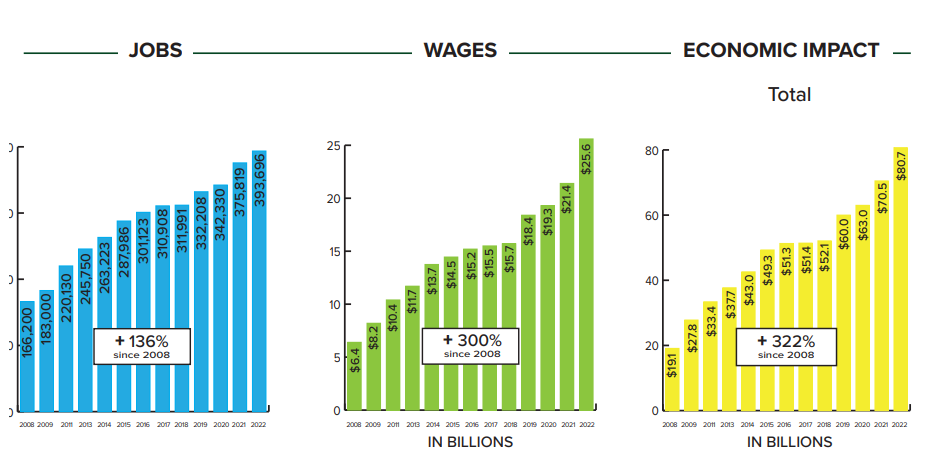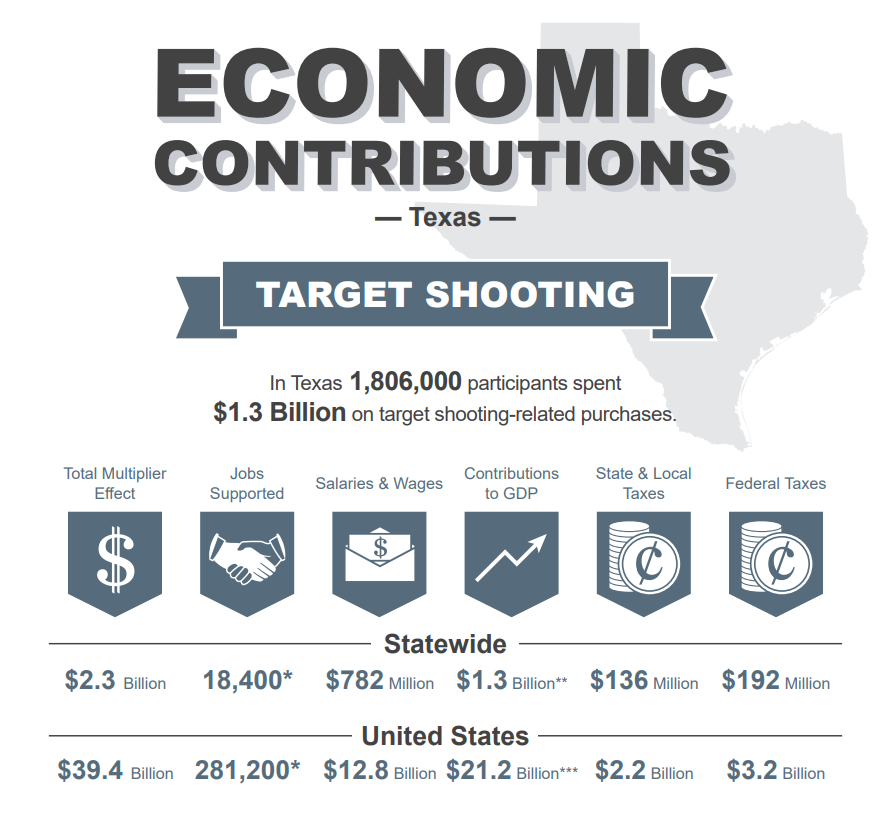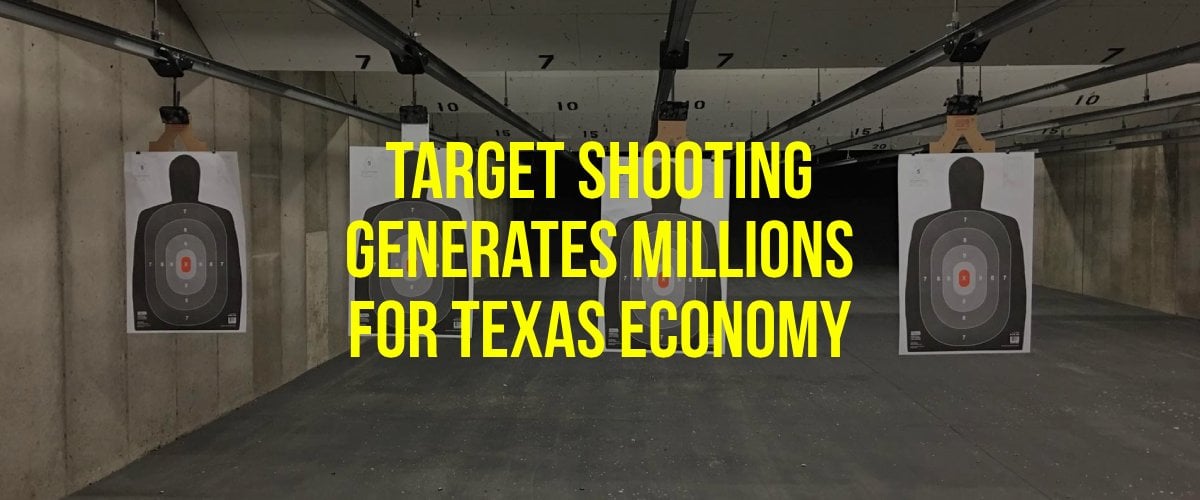Every month, hundreds of individuals flock to GRITR Range, a shooting range in North Richland Hills, TX. Some come alone to hone their skills, others introduce their children to the world of shooting, while many simply enjoy a weekend out with friends. Yet, unbeknownst to them, each visit contributes to an underlying economic force that’s consistently at work. The influence of shooting ranges and target shooting activities extends far and wide, impacting not just the direct participants but also the broader communities. In this article, we delve into the intricate ways in which shooting sports stimulate the economy.
the economic impact of target shooting
To fully understand the economic impact of shooting ranges, we must first look at the broader economic influence of target shooting and the firearm industry on a national scale.
According to the Economic Impact of Hunting and Shooting Report by Southwick Associates (2020), target shooting is very popular. In that year alone, nearly 20 million Americans spent almost 400 million days target shooting. This enthusiasm for target shooting not only fuels the sport but also translates into considerable economic contributions. A substantial sum of $15.6 billion was spent on purchases related to target shooting, significantly contributing to our country’s GDP, adding $21.2 billion. The overall economic influence of target shooting is immense, amounting to $39.448 billion nationwide and supporting 281,200 jobs. As for tax revenues, target shooting generated $3.158 billion for the federal government and an additional $2.247 billion for state and local governments.
Diving deeper into the statistics, handgun shooting emerged as the most popular form of target shooting, with 13.8 million enthusiasts dedicating a total of 166,824,400 days to this pastime. It was followed by rifle shooting, shotgun sports, and muzzleloader shooting, enjoyed by 11.6 million, 10 million, and 2.7 million people, respectively.
The 2022 Special Report on Hunting & the Shooting Sports shows that even with hurdles such as the high cost of equipment and ammunition, limited access to shooting ranges, and overcrowding at these ranges, the passion for target shooting persists. Over half of the shooters surveyed — 56% to be exact — indicated their intent to engage in firearm target shooting eight or more times throughout 2022.
Now, let’s shift our focus to the broader firearm industry. The Firearm and Ammunition Industry Economic Impact Report by NSSF (2023) states that the industry employed more than 390,000 people in 2022. But the impact of the industry isn’t limited to the direct jobs it offers. It also stimulates suppliers and related industries, creating an extra 220,999 positions.
In 2022, the firearm and ammunition industry generated $80.73 billion nationwide. On top of that, the industry and its workforce contributed more than $7.48 billion in tax revenues. These numbers highlight the substantial impact the industry has on every state and community across the nation. And with about 4.2 million people becoming new gun owners in 2022, the trend is set to persist, further amplifying the industry’s economic contribution.

The Role of Gun Ranges in Texas Economy
Now, let’s narrow down our focus to the state level and explore how shooting sports specifically impact the economy of Texas.
According to the report by Southwick Associates (2020), Texas stands out as a heavyweight in the realm of shooting sports. The Lone Star State led the nation with the highest total number of days spent shooting, clocking in at an impressive 31,839,000 days in 2020.
Delving into the specifics, Texas was the number one state for handgun shooting, logging 14,680,000 days at the range. As for rifle shooting, California took the lead with 10,696,600 days spent at the firing line. However, Texas maintained a strong presence, securing the second spot with 8,893,200 days dedicated to rifle shooting.
The economic implications of these shooting activities are substantial. In terms of retail sales related to target shooting, Texas once again led the pack with a whopping $1.3 billion in revenue. Also, target shooting directly created 18,400 jobs in Texas.

Conclusion: Are Gun Ranges Good?
As we’ve seen throughout this exploration, shooting ranges and shooting sports play an integral role in supporting local and state economies. They contribute significantly to the U.S. GDP, generate substantial tax revenues, and create numerous direct and indirect jobs across the country.
Shooting sports encompass a wide array of activities that cater to diverse interests and skill levels. From plinking with handguns or rifles at paper or steel targets for fun and practice to participating in skilled long-range rifle shooting matches that require precision and discipline, there is a shooting activity for everyone.
These diverse activities are not confined to rural areas or shooting clubs. Some can be enjoyed anywhere, even in large cities and suburbs where indoor ranges have become increasingly popular.
Take GRITR Range, for instance. Located right in the heart of the DFW area, GRITR Range is an advanced indoor gun range with an extensive collection of guns available for rent. Our technologically advanced lanes are available at affordable prices. Plus, being based within the facilities of GRITR Sports gun store offers our patrons the convenience of stocking up on ammunition, picking a match-grade holster, or buying a gun they’ve just been trying out in the range.
In essence, shooting ranges and shooting sports are more than recreational activities. They are economic drivers that support local businesses, create jobs, and contribute to the economic well-being of communities across the country. As we continue to enjoy these activities, we also inadvertently contribute to the broader economic landscape of our nation.
If you’ve never been at a shooting range but really want to start visiting, check out this guide for shooting range first-time visitors. It explains how to prepare and what to do when at a gun range.
FAQ
Are shooting ranges good for the economy?
Yes, shooting ranges have a positive impact on the economy. The economic impact of target shooting nationwide came in at $39.448 billion and supported 281,200 jobs.
Are all states equally impacted?
The economic impact varies by state, depending on factors like the number of shooting ranges, local laws, and participation rates.
How do shooting ranges impact the Texas economy?
Target shooting has a notable influence on the Texas economy, with the industry estimated to generate over $2.3 billion in economic impact.


